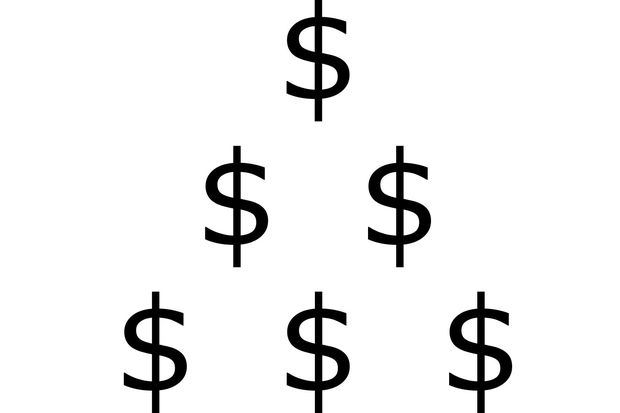Bitcoin is frequently mischaracterized. That's understandable, because bitcoin is a very complex subject and it is difficult to fully understand. Recently, author Nassim Taleb has called bitcoin an "open Ponzi" scheme, which is why I decided to write about bitcoin through the lens of the Ponzi scheme, asking (and answering) the question: Is bitcoin a Ponzi scheme?

Bitcoin does not fit the definition of a Ponzi scheme. A guaranteed return with little or no risk is a crucial part the Ponzi scheme definition and bitcoin comes without such a guarantee, no matter how you slice it. Traditional money fits the Ponzi scheme definition much better as we shall explore.
What is a Ponzi Scheme?
To see if bitcoin fits the definition of a Ponzi scheme, we need to understand what a Ponzi scheme is. A Ponzi scheme is a form of fraud whihc is most common in the investment industry. The American Securities and Exchange Commission (SEC) has a definition on their website:
Quote: "A Ponzi scheme is an investment fraud that pays existing investors with funds collected from new investors. Ponzi scheme organizers often promise to invest your money and generate high returns with little or no risk. But in many Ponzi schemes, the fraudsters do not invest the money. Instead, they use it to pay those who invested earlier and may keep some for themselves.
With little or no legitimate earnings, Ponzi schemes require a constant flow of new money to survive. When it becomes hard to recruit new investors, or when large numbers of existing investors cash out, these schemes tend to collapse.
Ponzi schemes are named after Charles Ponzi, who duped investors in the 1920s with a postage stamp speculation scheme."
Source: sec.gov
There are a couple of red flags to look out for which the sec has listed on their site as well. These red flags are:
- High returns with little or no risk
- Overly consistent returns
- Unregistered investments
- Unlicensed sellers
- Secretive, complex strategies
- Issues with paperwork
- Difficulty receiving payments
So, to see if bitcoin qualifies as a Ponzi scheme then, we need to look out for these red flags and see if bitcoin fits these definitions.
Why Bitcoin is no Ponzi Scheme
Red Flag 1: High Returns With Little or no Risk
A Ponzi scheme shows consistent "investment" returns exceeding the usual market rate, because that's the best way for a fraudster to attract new investors. People lack in terms of due diligence if the money is flowing. Both the magnitude and consistency of returns seem attractive to new investors.
Bitcoin has had high returns historically, that is true. But these returns were not guaranteed and came with a lot of volatility. Bitcoin had drawdowns in the range of minus 80 percwent in the past and just recently went from 65 thousand dollars to 28 thousand dollars, a draw down of 57 percent. That's by no means low risk, if you look at risk through the lens of the U.S. dollar exchange rate.
Red Flag 2: Overly Consistent Returns
I've mentioned that already in the above paragraph. Returns are not consistent in bitcoin. There are months were most of the price advances happen and these months are then followed by often violent draw downs. Consistency is entirely missing here.
Red Flag 3: Unregistered investments
Bitcoin requires no additional investment. Bitcoin itself is money. By buying bitcoin, you're buying money and you are storing your value and savings in a hard money. Bitcoin is not an investment fund. A Ponzi scheme might go ahead and purchase unregistered investments. Bitcoin, as an open source computer network does not pass your money on to something else. In fact, bitcoin is money itself.
Red Flag 4: Unlicensed sellers
Because I am no lawyer, i cannot intelligently comment on legal aspects around bitcoin sellers. What I know, is that Bitcoin is sold on exchanges and KYC enforcing exchanges around the world should be licensed to do so. There are peer to peer exchanges available, if you want to go down the non-KYC route. I cannot say if those need licenses or not as I said, I am no Lawyer. But because you're buying money, which is fungible and can be sold back into U.S. dollars and other fiat, I'd have a hard time immagining how bitcoin from one exchange is diffrent to bitcoin from another, which might be considered unlicensed.
Red Flag 5: Secretive, complex strategies
Investing, or better saving, in bitcoin is simple. Buy, store in self storage and hold (or hodl). That's it, that's the secret sauce to saving bitcoin. Exchange fiat for it, keed it and be done. That's neither secretive, nor complex.
Red Flag 6: Issues with paperwork
Bitcoin needs no paperwork. Transitioning into bitcoin from fiat dollars might produce some paperwork on a KYC exchange. There are certainly no issues in general with that.
A Ponzi scheme needs to hide details from you, because its a fraud after all. Bitcoin is an open system. The code base is open source, audit-able by anybody in the world at any time. Bitcoin has been like that from the beginning. The protocol is transparent and always has been. There's nothing hidden from you, no "magic sauce". Everything is happening in plain sight.
Bitcoin was launched in a fair way too. Everybody in the world could participate in the network after it went live in January 2009 and everybody could purchase bitcoin from when it first started trading on exchanges. In the early days, there were even faucets giving away bitcoin for free to interested users. Such faucets exist to this day on the lightning network, where small amounts of bitcoin are given to interested users.
Can you think of a fair Ponzi scheme, where money is just given away?
Red Flag 7: Difficulty receiving payments
Difficulty receiving payment is not a factor in bitcoin. Exchanging bitcoin back into fiat dollars is no different than buying it in the first place. All you need is an account with an exchange or with a peer to peer trading platform and you can convert bitcoin back into dollars. In fact, the market is open 24/7, all day every day even on holidays. Can you name a Ponzi scheme, that would let you cash out during every minute of the year?
A poor fit
Bitcoin is a poor fit for the Ponzi scheme definition. There's no guaranteed price at which you can cash out in the future. There's no low risk in terms of volatility. Bitcoin has enormous volatility.
Bitcoin has no marketing department or sales team behind it. It has educators, who explain what bitcoin is and why it is valuable but there's no central authority behind it, no master mind. Bitcoin is decentralized.
Fiat currency fits the Ponzi definition better
In a nutshell, a Ponzi scheme takes investment from new investors to credit the accounts of old investors, which is why it is also called a pyramid scheme sometimes.
If we think of the fiat currency fractional reserve banking system, we must conclude that it fits the pyramid scheme (or Ponzi) characteristics much better than bitcoin. Why?
Constant money printing
Let's look at the expansion of the monetary base over time. The U.S. dollars in circulation have expanded at 7 percent per year annually going back decades. The system is reliant on constant expansion. I base that statement on observation of history.
If expansion stops for any reason, we're in a rough situation such as in March 2020 and in the financial crisis of 2008 and 2009. The economic pain, which was experienced in these times resulted in accommodative monetary policy. More expansion. At the same time, governments have behaved fiscally irresponsibly across party lines and across countries.
New debts are created to pay back old debts. New money pays for old debts. Does that sound like a Ponzi to you? Because in a Ponzi scheme, new investors contributions are used to pay out older investors. Why is that different on a nation state level, where new debts pay for old debts? In that sense, the global fractional reserve fiat banking system fits the Ponzi characteristic much better, than bitcoin does. Bitcoin has a hard limit of 21 million units. There's not going to be ever expansionary printing in the bitcoin ecosystem. Fiat, on the other hand relies on it. Fiat is the Ponzi, not bitcoin.
You have reached the end of Is Bitcoin a Ponzi Scheme? Thank you for your attention.
Have you considered signing up for a bitcoin savings plan? If you set up one with Swan bitcoin you get 10 dollars for free with my referral.
Support Me
You've reached the end of Is Bitcoin a Ponzi Scheme? This website was made and is maintained by Jogi. You can follow me on twitter here: @proofofjogi. You can also directly support bitcoin is the better money dot com by leaving me a tip if you would like to. Thank you for your support.
